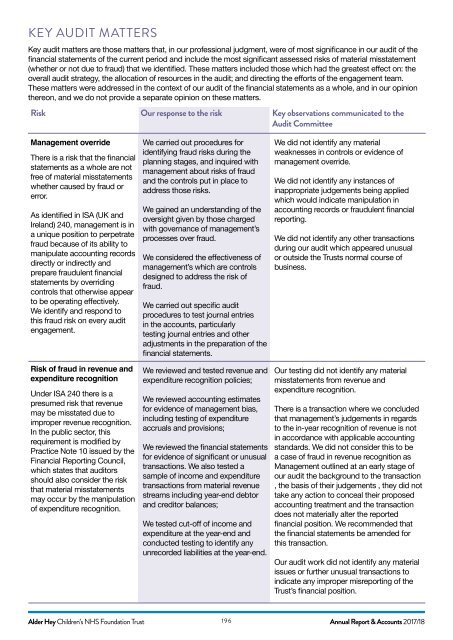AH ANNUAL REPORT 2018
Create successful ePaper yourself
Turn your PDF publications into a flip-book with our unique Google optimized e-Paper software.
KEY AUDIT MATTERS<br />
Key audit matters are those matters that, in our professional judgment, were of most significance in our audit of the<br />
financial statements of the current period and include the most significant assessed risks of material misstatement<br />
(whether or not due to fraud) that we identified. These matters included those which had the greatest effect on: the<br />
overall audit strategy, the allocation of resources in the audit; and directing the efforts of the engagement team.<br />
These matters were addressed in the context of our audit of the financial statements as a whole, and in our opinion<br />
thereon, and we do not provide a separate opinion on these matters.<br />
Risk Our response to the risk Key observations communicated to the<br />
Audit Committee<br />
Management override<br />
There is a risk that the financial<br />
statements as a whole are not<br />
free of material misstatements<br />
whether caused by fraud or<br />
error.<br />
As identified in ISA (UK and<br />
Ireland) 240, management is in<br />
a unique position to perpetrate<br />
fraud because of its ability to<br />
manipulate accounting records<br />
directly or indirectly and<br />
prepare fraudulent financial<br />
statements by overriding<br />
controls that otherwise appear<br />
to be operating effectively.<br />
We identify and respond to<br />
this fraud risk on every audit<br />
engagement.<br />
Risk of fraud in revenue and<br />
expenditure recognition<br />
Under ISA 240 there is a<br />
presumed risk that revenue<br />
may be misstated due to<br />
improper revenue recognition.<br />
In the public sector, this<br />
requirement is modified by<br />
Practice Note 10 issued by the<br />
Financial Reporting Council,<br />
which states that auditors<br />
should also consider the risk<br />
that material misstatements<br />
may occur by the manipulation<br />
of expenditure recognition.<br />
We carried out procedures for<br />
identifying fraud risks during the<br />
planning stages, and inquired with<br />
management about risks of fraud<br />
and the controls put in place to<br />
address those risks.<br />
We gained an understanding of the<br />
oversight given by those charged<br />
with governance of management’s<br />
processes over fraud.<br />
We considered the effectiveness of<br />
management’s which are controls<br />
designed to address the risk of<br />
fraud.<br />
We carried out specific audit<br />
procedures to test journal entries<br />
in the accounts, particularly<br />
testing journal entries and other<br />
adjustments in the preparation of the<br />
financial statements.<br />
We reviewed and tested revenue and<br />
expenditure recognition policies;<br />
We reviewed accounting estimates<br />
for evidence of management bias,<br />
including testing of expenditure<br />
accruals and provisions;<br />
We reviewed the financial statements<br />
for evidence of significant or unusual<br />
transactions. We also tested a<br />
sample of income and expenditure<br />
transactions from material revenue<br />
streams including year-end debtor<br />
and creditor balances;<br />
We tested cut-off of income and<br />
expenditure at the year-end and<br />
conducted testing to identify any<br />
unrecorded liabilities at the year-end.<br />
We did not identify any material<br />
weaknesses in controls or evidence of<br />
management override.<br />
We did not identify any instances of<br />
inappropriate judgements being applied<br />
which would indicate manipulation in<br />
accounting records or fraudulent financial<br />
reporting.<br />
We did not identify any other transactions<br />
during our audit which appeared unusual<br />
or outside the Trusts normal course of<br />
business.<br />
Our testing did not identify any material<br />
misstatements from revenue and<br />
expenditure recognition.<br />
There is a transaction where we concluded<br />
that management’s judgements in regards<br />
to the in-year recognition of revenue is not<br />
in accordance with applicable accounting<br />
standards. We did not consider this to be<br />
a case of fraud in revenue recognition as<br />
Management outlined at an early stage of<br />
our audit the background to the transaction<br />
, the basis of their judgements , they did not<br />
take any action to conceal their proposed<br />
accounting treatment and the transaction<br />
does not materially alter the reported<br />
financial position. We recommended that<br />
the financial statements be amended for<br />
this transaction.<br />
Our audit work did not identify any material<br />
issues or further unusual transactions to<br />
indicate any improper misreporting of the<br />
Trust’s financial position.<br />
Alder Hey Children’s NHS Foundation Trust 196<br />
Annual Report & Accounts 2017/18


